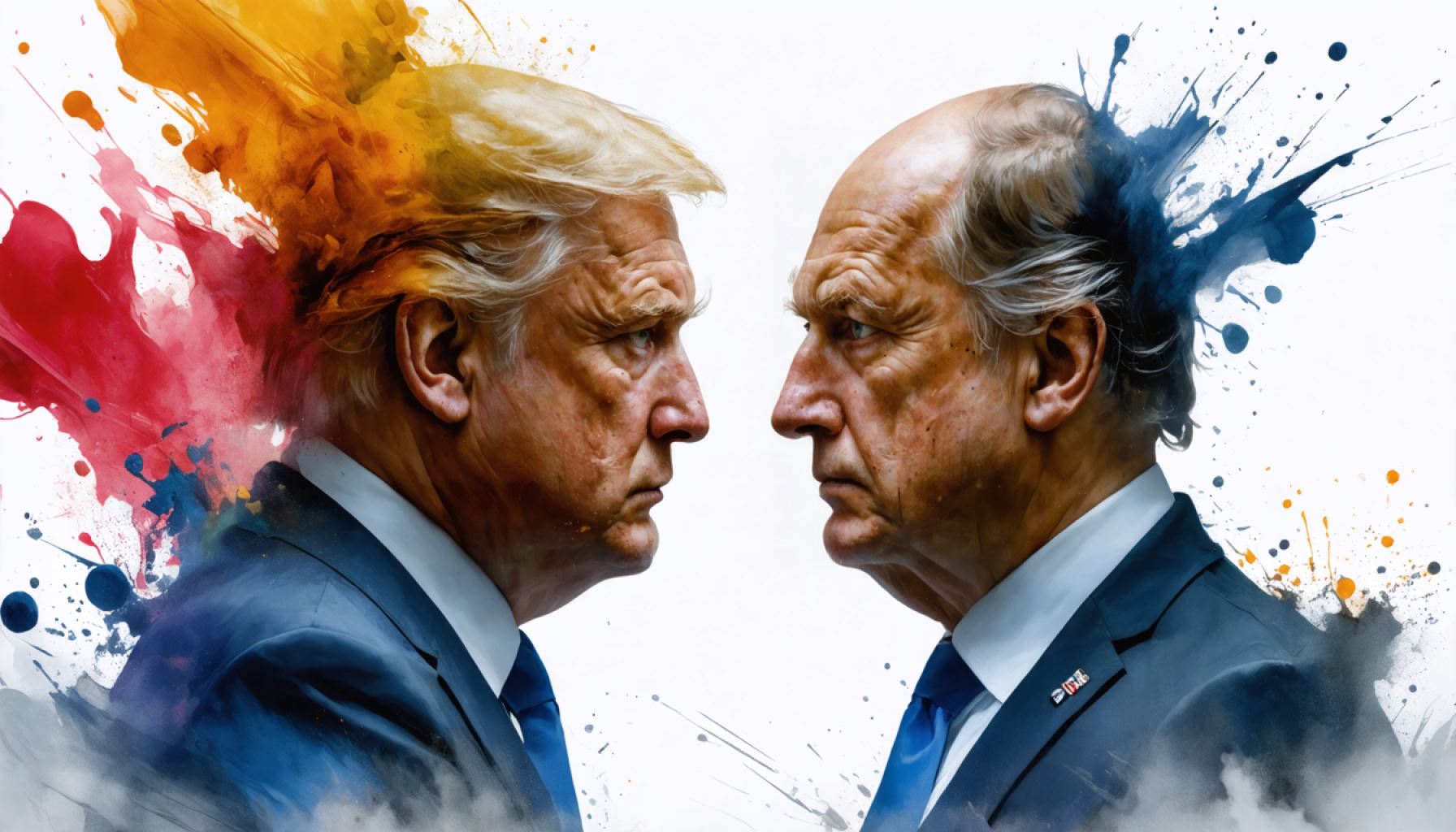- Germany faces a pivotal political contest featuring Friedrich Merz and Olaf Scholz, each representing distinct leadership paths.
- Friedrich Merz showcases a transformation from impetuous conservatism to composed statesmanship, aiming to guide the nation.
- Olaf Scholz sheds his bureaucratic image, adopting a dynamic and assertive approach to reenergize his campaign.
- A documentary by Mathis Feldhoff and Andreas Huppert provides an intimate look at Merz and Scholz’s personal and political journeys, highlighting their introspection and ambition.
- The film reflects Germany’s current political climate, sparking discussions on leadership, identity, and the nation’s future.
- As Germany anticipates the February deadline, the nation is at a crossroads, questioning who will shape its trajectory forward.
A political contest like no other unfolds in Germany, where Friedrich Merz and Olaf Scholz embrace their markedly divergent paths in an electrifying battle for the chancellorship. Set against the backdrop of a nation poised for change, this gripping narrative captures the contrasting personas of two leading figures whose journeys reveal as much about themselves as about Germany’s future.
Friedrich Merz, the once restless conservative, emerges with an air of composure and statesmanship in his quest to steer the nation. His calculated steps mark a stark transformation from his past impetuousness, reflecting not merely a strategy, but a metamorphosis. Meanwhile, Olaf Scholz, traditionally the quiet bureaucrat, unveils a more forceful and vibrant persona. His candid words resonate through the corridors of power, painting him in an unforeseen light.
The tension mounts as filmmakers Mathis Feldhoff and Andreas Huppert offer an intimate exploration into these two figures through their documentary, unveiling moments of introspection and ambition. As the campaign trails wind through German cities, revealing at every turn the complex tapestry of supporters and skeptics, questions linger: Will Merz’s seasoned yet divisive tactics hold sway? Can Scholz overturn his waning popularity to reclaim his position?
As the documentary unfolds, it becomes a mirror reflecting Germany’s pulse, rife with questions about leadership, legacy, and the very soul of a nation at the crossroads. In this captivating saga, it isn’t merely a question of political victory but one of identity and evolution. With eyes locked on the February deadline, Germany watches, waits, and wonders who will emerge as the architect of their future.
The Battle for Germany’s Future: Merz vs. Scholz
Understanding the Conflict: Friedrich Merz vs. Olaf Scholz
The German political scene is electrifying as Friedrich Merz and Olaf Scholz vie for the chancellorship, each embodying a unique vision for the country’s future. As Merz channels a refined conservatism and Scholz sheds his bureaucratic demeanor for a more dynamic approach, Germany stands at a crossroads filled with both uncertainty and potential.
How-To Steps & Life Hacks: Navigating Political Engagement
1. Stay Informed: Regularly check reliable news sources such as DW and Der Spiegel for updates on political developments.
2. Understand the Platforms: Analyze party platforms and candidates’ policies. Look beyond headlines and assess their potential impact on your life.
3. Engage in Discussion: Join forums or local discussion groups to exchange views and understand diverse perspectives.
4. Fact-Check Information: Utilize sites like FactCheck.org to validate political claims and counter misinformation.
Real-World Use Cases: Merz and Scholz on Global Challenges
– Economic Recovery: Both candidates offer distinct strategies for post-COVID economic recovery, with Merz focusing on conservative fiscal policies and Scholz aiming to boost spending on infrastructure and innovation.
– Environmental Sustainability: Scholz prioritizes aggressive climate policies aligning with EU’s Green Deal, whereas Merz supports a gradual transition emphasizing economic stability.
Market Forecasts & Industry Trends
Political leadership influences Germany’s economy and industries significantly:
– Automotive Sector: Expect continued shifts towards electric vehicle manufacturing, driven by European regulatory changes.
– Renewable Energy: Investment in green technologies will likely increase, regardless of the electoral outcome.
– Technology and Digitalization: A focus on digital infrastructure and innovation is key, with both candidates advocating for advancements.
Reviews & Comparisons: Leadership Styles
– Merz: Traditional, cautious, with a focus on financial discipline and conservative values.
– Scholz: Progressive, advocating for strong social policies and an expansive view on government intervention.
Controversies & Limitations
– Merz: Criticized for divisive tactics and a conservative approach that does not resonate with younger voters.
– Scholz: Faces challenges with his previous policy stances and their alignment with current progressive demands.
Features, Specs & Pricing: The Campaign Landscape
– Campaign Funding: Both candidates are supported by well-funded party organizations, reflecting their deep-rooted positions within German politics.
– Geographic Considerations: Regional differences in support highlight Germany’s diverse political landscape, impacting electoral strategies.
Security & Sustainability
Security remains a crucial concern, with both emphasizing policy on cyber defense and sustainable economic practices to bolster long-term growth and innovation.
Insights & Predictions
As Germany moves towards its critical electoral deadline, expect:
– Youth Engagement: Both parties work to secure the vote of younger demographics, crucial for future political trends.
– Increased Polarization: The disparity between the Merz and Scholz camps may lead to increased political discourse and debate.
Tutorials & Compatibility: Engaging in Political Discourse
Engage respectfully in political conversations by:
– Leading with facts and validated information.
– Listening actively to opposing views.
– Finding common ground on broad issues like economic stability and climate change.
Pros & Cons Overview
Merz
– Pros: Stability, fiscal discipline
– Cons: Perceived older approach, less appeal to younger voters
Scholz
– Pros: Progressive policies, social investments
– Cons: Historical policy stances, potentially polarizing
Conclusion: Quick Tips for Political Engagement
1. Subscribe to newsletters from major German media outlets.
2. Attend or view political debates to see candidates in action.
3. Volunteer for local political campaigns to experience grassroots politics.
Overall, Germany’s political future hinges on the vision of the next chancellor. Friedrich Merz and Olaf Scholz present both opportunity and challenge, making this a dynamic period in German history. Stay informed, engage respectfully, and participate in shaping the nation’s future.
